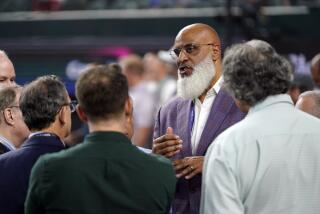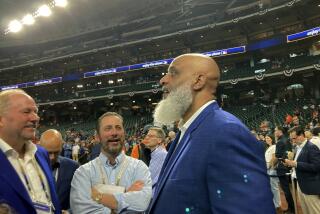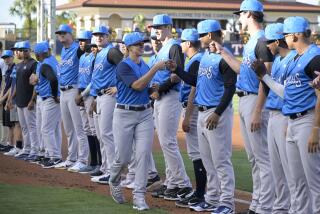If Lockout, No Team Workouts : Baseball: Fehr will recommend players not practice together if owners do not open spring training camps.
Don Fehr, executive director of baseball’s Major League Players Assn., said Wednesday that if the owners conduct a lockout of spring training camps he will recommend to the players that they not work out in groups.
“I would suggest that they work out as they have all winter, but that they not accelerate those workouts and that they not work out as a team,” Fehr said. “That’s a longstanding position going back to 1976, and there are two reasons for it.”
The first is that the players would not be covered by club insurance, he said. The second is that it is easier for the clubs to string out the collective bargaining negotiations if they know their players are preparing physically, just as they would be if the camps were open.
The owners have indicated that the essential points of a new bargaining agreement must be approved by Feb. 15 or there will be a lockout. Fehr said Wednesday that a protracted lockout would make it unlikely that the season could open April 2 as scheduled, particularly since the players will not have been working out.
Representatives of the owners’ Player Relations Committee attempted to explain their revenue-sharing proposal to 37 players attending a negotiating session in Tampa, Fla., Wednesday, but there was no progress toward a settlement, both sides said.
Fehr said that the union has yet to get an explicit explanation as to why a radical change is needed. The clubs’ proposal would modify free agency and eliminate arbitration and guaranteed and multiyear contracts for players with zero to six years of major league service.
Salaries for players in that category would be shared equally by the 26 teams and determined by a statistical table.
“They keep talking about problems that clubs in the smaller markets are going to have, but they haven’t been able to quantify it and they have even said they can’t,” Fehr said. “Well, if they can’t, how are we supposed to identify the problem and say, ‘Yes, there is need for this kind of radical change?’
“They have to satisfy us that it would be better for the players or that there is compelling need for it, and so far they haven’t done either.”
Charles O’Connor, interim director of the PRC, acknowledged that the union has probably not accepted the clubs’ explanations, but that the proposals will continue to be discussed.
He said revenue sharing would be phased in gradually and, perhaps, would not be totally in place for three or four years, but he reiterated that the time to do it is in a non-crisis situation, while the industry is still healthy. He also reiterated that the owners must have an agreement from the union by Feb. 15 that substantive change is needed or there will be a lockout.
The sides will meet in Tampa again today, then return to New York to resume negotiations next week. Fehr said he would be in Los Angeles to meet with players living in this area sometime in the next two weeks.
More to Read
Go beyond the scoreboard
Get the latest on L.A.'s teams in the daily Sports Report newsletter.
You may occasionally receive promotional content from the Los Angeles Times.










